La conférence Coworking Africa, le 1er événement organisé en Afrique sur la thématique du coworking, se tiendra au Cap, en Afrique du Sud, les 23 et 24 juillet 2015. 
Le coworking est un concept d’espace de travail mutualisé qui monte en puissance partout dans le monde. Plutôt que de payer un loyer, comme dans un bureau classique, les utilisateurs paient un abonnement correspondant à la durée d’utilisation de l’espace.
Le modèle est particulièrement adapté pour les travailleurs indépendants, les entrepreneurs et les startups qui peuvent ainsi partager les coûts d’accès à une infrastructure de qualité, dans laquelle ils ont accès une connexion internet partagée.
Grâce à la mise en commun de l’infrastructure, les espaces de coworking deviennent le lieu de fixation de communautés dynamiques d’entrepreneurs et de travailleurs qualifiés. Désormais, beaucoup hébergent des programmes d’accélération de startups et structurent les écosystèmes créatifs dans les villes ou régions où ils se trouvent.
L’Afrique prête pour un essor rapide du coworking 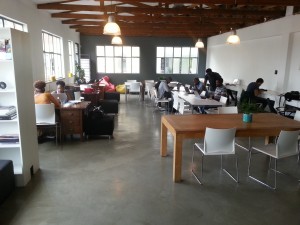
Plus de 5.800 espaces de coworking sont aujourd’hui recensés dans le monde. Le nombre double chaque année.
Si l’Europe et les Etats-Unis sont à ce jour leaders, le coworking connaît aujourd’hui un essor rapide en Afrique également. Cette évolution est alimentée, entre autres, par le développement récent de communautés d’entrepreneurs digitaux dans de nombreux pays africains, par l’amélioration progressive de l’accès à internet haut débit ou encore par la croissance démographique qui fait de l’Afrique la population la plus jeune du globe. Partout, les espaces de coworking deviennent les lieux privilégiés d’où démarrent la plupart des nouveaux projets de startups. L’Afrique ne fait pas exception.
La conférence Coworking Africa 2015 entend réunir plus d’une centaine de participants d’Afrique et d’ailleurs.
La première conférence africaine sur le Coworking, vise à créer des liens et des échanges entre opérateurs d’espaces. Coworking Africa 2015 s’adresse aux gestionnaires d’espaces de coworking, aux porteurs de projets d’espace de coworking, mais aussi aux représentants d’organisations publiques, aux gestionnaires d’incubateurs d’innovation, de programmes de mentorat, d’accélération de startups, aux organisation non gouvernementales, aux fondations, ou encore aux entreprises liées ou pas aux mondes digitaux…
Les organisateurs de cette première conférence africaine sur le coworking ont l’espoir que l’initiative tissera des premiers liens durables entre les opérateurs d’espaces de coworking africains et qu’elle fera connaître l’impact positif que le développement de l’offre coworking peut avoir en l’Afrique. La conférence a aussi pour objectif de faire apparaître la communauté coworking d’Afrique sur la carte du coworking au niveau mondial
Plus de détails sur le programme et les orateurs : www.coworkignafrica.com
Organisation :
Coworking Africa 2015 est le fruit d’un partenariat entre Global Enterprise et Cape Town Office.
Global Enterprise est l’initiateur de la conférence Coworking Europe conference. La dernière édition, tenue à Lisbonne, avait réunii plus de 320 participants issus de 40 pays différents. Coworking Europe collabore étroitement avec GCUC, organisateur de la conférence américaine sur le coworking, et associés aux événements similaires en Australie et au Canada.
Cape Town Office, fondé par Lizelle van Rhyn, est l’un des pionniers du coworking en Afrique du Sud. L’espace est située au Cap.
Lieu et dates:
23 et 24 juillet 2015
East Studio (62 Roeland Street. Le Cap, Afrique du Sud)
Inscription :
http://coworkingafrica.com/book-now/
Accreditation média : vanessa@coworkingafrica.com
Suivez-nous sur les réseaux sociaux:
https://www.facebook.com/CoworkingAfrica
Twitter : @CoworkingAfrica
Contact :
Jean-Yves Huwart Vanessa Sans Lizelle Van Rhyn (au Cap)
jy.@coworkingafrica.com vanessa@coworkingafrica.com lizelle@capetownoffice.com
T
[1] Deskmag Global Coworking Survey 2014
Jon Stever is the Founder of The Office, a community workspace and hub of hubs that hosts and connects the grassroots innovation and entrepreneurial ecosystem in Kigali, Rwanda. 
Last week, the prestigious british weekly The Economist issued an article on the rapid expansion of coworking in Africa.

JoziHub, Johannesburg
« While coworking spaces are heralded in the rich world as trendy, open spaces conducive to networking and brainstorming, in Africa they serve a far more practical purpose: coworking spaces mitigate the exorbitant costs of setting up and running an office », writes the magazine.
This is indeed a statement that we share, as coworking Africa conference’s organizers. Maybe, nowhere in the world is coworking more important than in Africa to let the middle class of digital savvy workers, freelancers and entrepreneurs rise up.
In 2014, Luanda (Angola) and N’Djamena (Chad), according to Forbes magazine, were the most expensive cities in the world with respect to the cost of living, ahead of Tokyo, London or Geneva. Victoria (in the Seychelles Islands) Libreville (Gabon) and Kinshasa (DRC) are also in the top 20 of the worlds most expensive cities as well.
The lack of proper infrastructures added to a rapid economical growth feeding demand for good quality offices, lands and goods, is an explanation of the rising disconnection between the average revenue per person in Africa and the cost of living in major cities.
Although too slowly, as opposed to other emerging areas, education in many African countries is improving. So is internet access and digital services provision. As more than 50% of the African population is under 20 years old, a huge skilled workforce is arising which will need places, convenient work environments, connectivity, meeting areas, informal learning and networking opportunities… The challenge is enormous.
Here comes coworking.
Mutualized community based infrastructures such as coworking spaces can provide them with a more affordable solution compared to what they are charged for an isolated office. In addition, coworking allows to split the cost of a generator or of a bandwidth capacity, a critical point in Africa, where power outages and bandwidth scarcity might impede the development of new businesses.
This is the reason why coworking could emerge as a must for modern digital and creative professionals in Africa as it does in Hong Kong, London, Paris, Barcelona or New York City.
As a matter of fact, these cities are steadily transforming themselves into coworking villages. Coworking has been acknowledged as one of the workplace models of the 21st century, where values such as positive social interactions, openness and serendipity are gaining ground.
As far as we are, though, in Africa, the growth of coworking spaces is mainly fueled by the mushrooming of tech hubs all over the continent.
According to the World Bank, close to 100 tech hubs are in operation across Africa. Have a look at this map of African tech hubs produced by Fab Foundation and Bongo Hive, in Zambia.
Thanks to these tech hub communities, Lagos, Nairobi, Cape Town and more are giving birth to a breed of great startups, in the mobile and web industries.
But what are Tech Hubs if not « dedicated coworking spaces » ?
This new tech hub IBM plans to open up soon in Johannesburg, for instance, will be built around a coworking space. So is KLab, in Kigali, and many more we could mention.
So, community based tech hubs are definitely part of the coworking family.
Industry wise, coworking spaces are sprouting in many different fields. The international network Impact Hub for instance, devoted to social entrepreneurs, has wide ambitions in Africa, with spaces soon to be opened in more than ten African countries, like here below in Accra.
Impact Hub Accra from John-Paul Parmigiani on Vimeo.
Coworking spaces put themselves also at crossroads. Between artists, designers and digital entrepreneurs, for instance. Take BongoHive, in Zambia.
« BongoHive is building connections between its new community and other communities, illustrates this blog supported by Cisco. It is now working with Zambian artists and photographers to build websites for them to showcase and sell their work. »
Vertically (focused) or horizontally (general) oriented, business or social minded, coworking spaces are blossoming in every directions in Africa, as it is elsewhere in the world. That said, whether they are tech hubs, vertically focused or stand alone spaces open to digitally enabled professionals, a coworking boom in a city is the evidence of a healthy growing ecosystem dynamic.
Startups and companies need skilled and creative workers, business savvy individuals, HR, law and marketing experts, around them to fuel their development. Coders are not enough.
From that perspective, Africa is not different than any other continent : the more coworking spaces communities you have, the better off your country will be !
Jean-Yves Huwart
Initiator of the Coworking Europe and Coworking Africa conferences
The Coworking Africa conference, the first major event organized on the topic of Coworking in Africa, is to take place in Cape Town, South Africa, on July 23rd and 24th 2015.
During two days, Cape Town will be the African capital of Coworking, an ever more successful work model that is becoming the natural professional environment of the new breed of digital workers, startups, and distributed companies who are shaping the economy of the 21st century. Coworking spaces are (mainly) open floor or building where people active on respective different businesses come to work on a same mutualised flexible place shared with peers.
Africa, too, is ready for a Coworking boom
More than 5.800 spaces are operating in the world. The number almost doubles every year. Although Africa still is a small player in the Coworking landscape, the booming tech scene and major demographic shifts are creating the ideal conditions to unleash the development of many more Coworking spaces all across the continent. Within the last 18 months, the number of Coworking spaces in Africa more than tripled. Nowadays, more than 100 units are in operation on the whole continent, to extend that one can now say : Coworking in Africa is now on the same growth trend Europe and the US were five years ago.
Coworking empowers freelancers, remote employees and entrepreneurs all over Africa in multiple ways. Infrastructure wise, coworking spaces are local hotspot where users can now benefit from an efficient connectivity solutions as well as access to an affordable qualitative working environment to operate their activity in African cities often experiencing high real estate costs. From a business perspective, the community dynamic of a Coworking spaces brings freelancers and small businesses with more visibility and networking opportunities to boost their activity. More broadly, Coworking spaces physically support the development of local entrepreneurial ecosystem, connected with other communities in Africa and in the rest of the world.
The best Coworking experts and practitioners will be in Cape Town in July 2015
More than 100 delegates from Africa and beyond are expected in Cape Town to attend the Coworking Africa 2015 conference.
The conference will operate as meeting platform which will facilitate the emergence personal relationships between the leaders of Coworking spaces, startup accelerators and incubators operators, Coworking catalysts and Coworking users, NGO’s, government representatives, foundations, tech companies and Coworking practitioners from outside Africa. All of them will have the opportunity to share ideas, opinions, knowledge and best practices during the two days conference.
By having a Coworking conference to Africa, the initiators of the conferences hope to support the development of an African Coworking awareness as well as a link between Coworking communities on the continent in order to bring Africa in a global move from which we all can end better off.
Organisation
Coworking Africa 2015 is the result of a partnership between Global Enterprise and Cape Town Office.
Global Enterprise is the producer of the Coworking Europe conference, already organized five times since 2010. The last edition of Coworking Europe took place in Lisbon, Portugal, and gathered 320 people from more than 40 different countries. Coworking Europe works closely with GCUC, organizer of the US Coworking conference GCUC, which has now branches in Australia and Canada.
Cape Town Office, founded by Lizelle van Rhyn, is one of the pioneer and one of the most reputed Coworking space in operation in South Africa. The space is located downtown Cape Town.
Karim Sy, founder of Jokkolabs, will be a speaker at the Coworking Africa 2015 in Cape Town.
Avec Jokkolabs, Karim Sy parie sur le « co-working » par Jeuneafriquetv
The Office, Kigali (Rwanda)
Crédit photo : The PlacesLoGoes
(source : theplaceslogoes.blogspot.be)
Deskmag Survey 2014 – CoworkingEU
With time, coworking is growing as the global mega-trend ones expected it would once become.
In some cities, in 2014, the coworking population exceeds a hundred. And far from slowing down, the unfolding of the coworking landscape seems to be accelerating. In some metropoles, coworking is covering the whole urban map.
Have a look at some of those megapoles. We could have added many more examples.
London is getting closer to a 100 coworking spaces threshold according to CoworkingLondon. The figures are confirmed, in a way, by Gocowo, another Londonese coworking spaces directory.
According to La Fonderie-IDF, the organizing partner of the Coworking Europe conference in 2012, 66 coworking spaces are in operation, nowadays, in the French capital city. The digital agency of Paris-Ile de France is confident that Paris will soon be in a position to claim more than 100 operating coworking spaces.
One of the bedrock of Coworking in Europe, Berlin has seen coworking spaces blossoming everywhere in the city. Dozens are now open and running, confirms Projektzukunft Berlin.
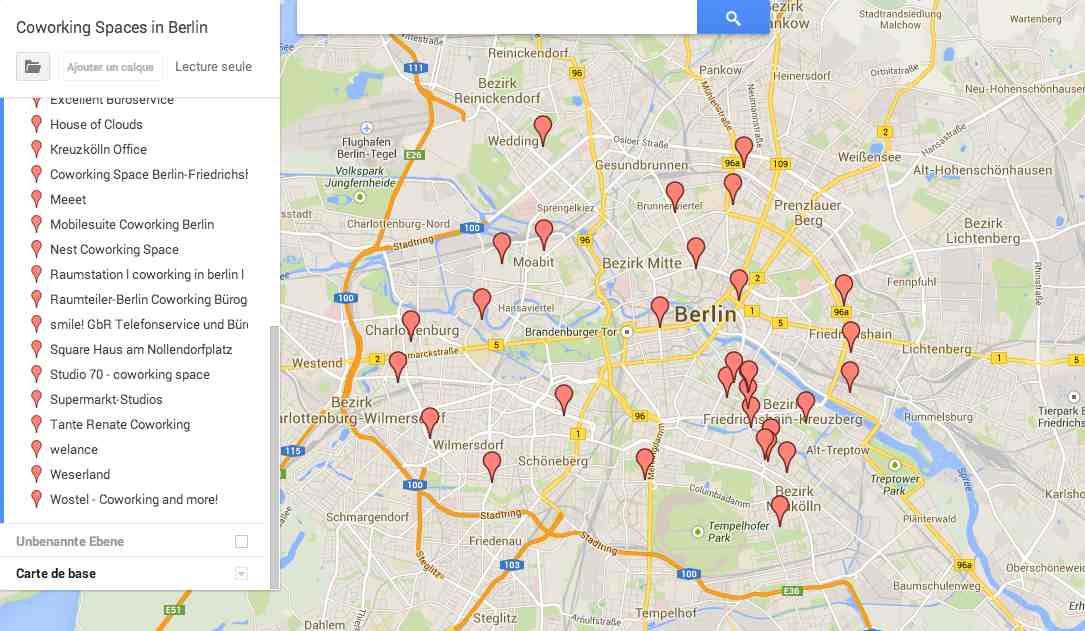
Spain being the number 1 coworking country in Europe, it’s no accident that Barcelona is nowadays the metropole with the highest coworking spaces density in the world. A big deal of the more than 100 spaces Barcelona has now pop on this map produced by Coworking Spain.
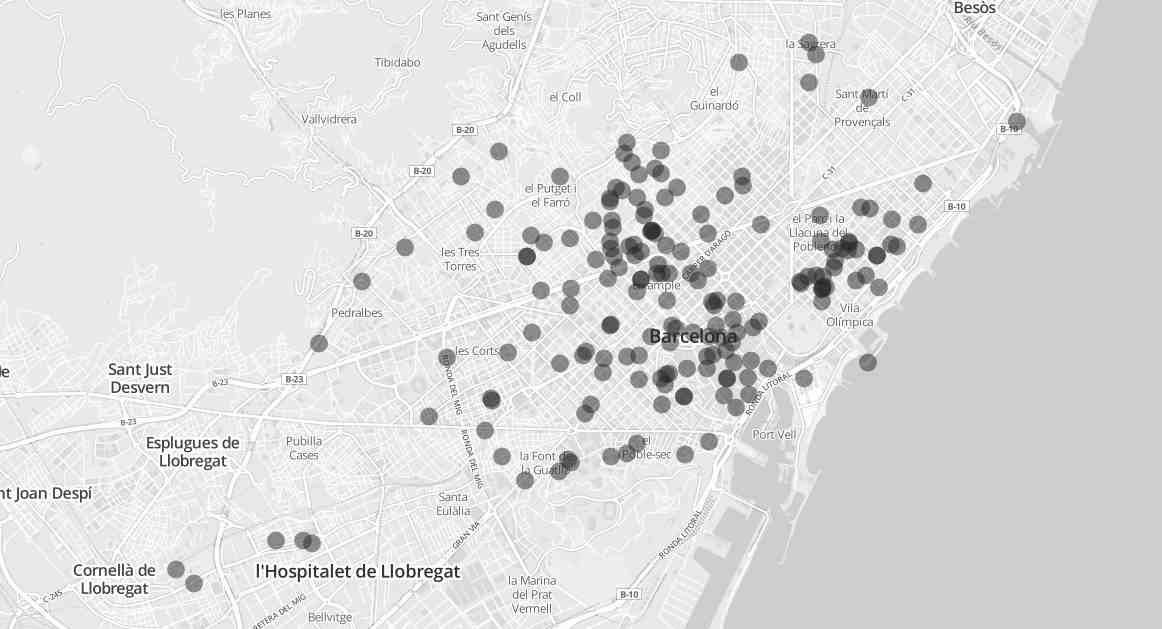
As for Barcelona, Madrid seems to be experiencing a coworking boom which should have, no doubt, an impact on the unfolding entrepreneurial and creative energy of the city (source of the map : Coworking Spain).
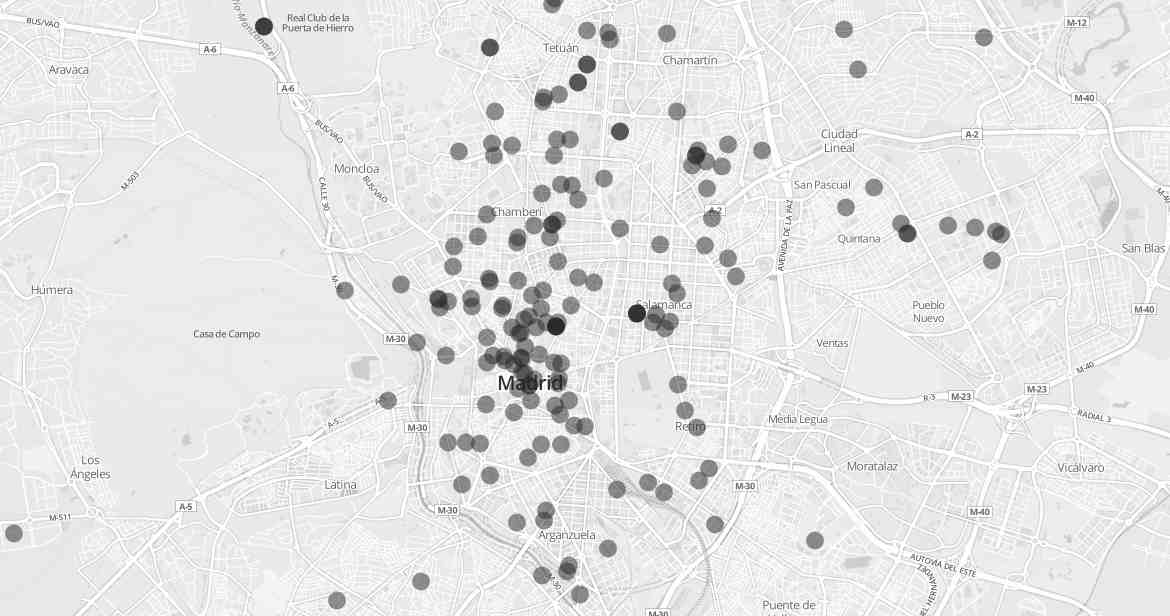
Outside Europe, New York City is obviously another unmissable world coworking hotspot. According to WNYC, dozens of coworking spaces are in operation all across the megapole. Behind those walls, the future of the 21st century digital/sustainable/distributed economy is taking shape.
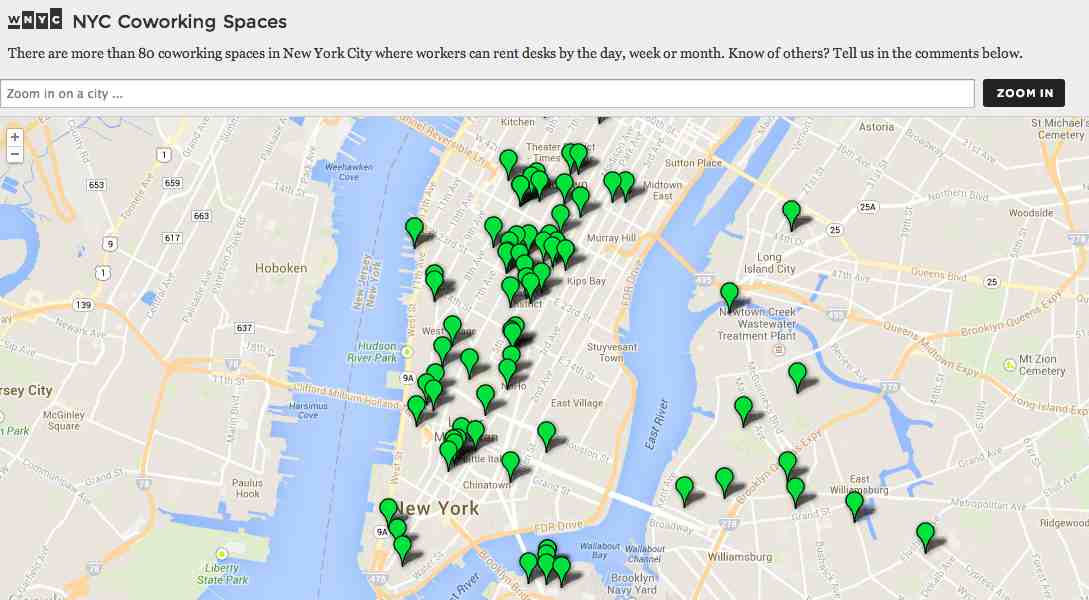
Looking at the Global Coworking Map or any other regularly updated Coworking directory that are now available online, it’s becoming harder to find a coworking space-free area outside low human density territories like Amazonia, Sahara or Siberia.
Coworking is covering up more and more regions and cities all around the globe. Although Europe and North America are still ahead of the move, Asia, Africa or, mostly, Latin America, are experiencing what could become soon a boom of coworking spaces in their respective urban centers.
No more New York, Berlin, London or Madrid as the only coworking friendly cities on the planet. Time has come to add Reykjavik, Yangon, Yerevan, Addis Ababa or even Peshawar to the list.
With four new coworking spaces opening up, on average, every day somewhere on the planet, no surprise to see Armenia, Cameroon, Guatemala, Pakistan and more widely embracing the coworking move forward.
Some of these initiatives are supported by foreign outsiders (investor or NGO’s). Others are home grown.
For most of them, a coworking space is the bedrock on which a local breed of digital globally connected entrepreneurs can and will germinate, paving the way for the companies and skilled jobs of tomorrow. Many operate as local embassies of the shared economy on the local level, as regional platform to host standardized inspiring format such as TEDx, Startup Weekend and connect, by doing so, to the rest of the world.
Almost all of them want to support the development of an ecosystem of entrepreneurs and freelancers, likewise in Europe or in North America.
Here is a list of ten of those new Coworking destinations :
Reykjavik Coworking, Reykjavik, Iceland
UtopianLab, Yerevan, Armenia
Ice Addis, Addis Ababa, Ethiopia
Hub Dhaka, Dhaka, Bangladesh
Hubud, Bali, Indonesia
Basecamp, Peshawar, Pakistan
TEDxPeshawar – Amir Anzur from Webpreneur Academy on Vimeo.
ActivSpaces, Douala, Cameroon
Project Hub Yangon, Yangon, Myanmar
Angkor Hub, Angkor, Cambodia
Coworking Europe is indeed, just around the corner.
For the 4th year the Coworking Europe conference takes a deep look at the developments of the burgeoning industry.
Having a look back at the topics of the past till now, we see a continuing growth of what is now undeniably an industry of onto itself. Although still young, many of the stakeholders involved are no longer new buds just peeking out of the ground, let’s say the movement is in late-spring, and roots are growing deeper.
Here is a bit of a look of what is to come in mid-November.
Although there is always room for debate, and most people involved in coworking are always up for a debate – the term ‘coworking’ was coined in 2006 in San Francisco.
One of the reasons for debate is that coworking has seemed to pop up all around the world, a new species of work, that finds its identity with coworking after late nights of business planning and research online.
For a few years already, we have seen coworking on every continent but Antarctica. People who came together to work started a space, opened it up to others, communities formed, and the spaces found a global community online to connect with.
Once the first buds come up, there is some care needed to ensure that they take root. Seasoned proprietors are, more often than not, eager to share best practices.
Many spaces which find success, find themselves with fruits that bear the seeds for new spaces. Although it is not for everyone to expand to bigger and multiple spaces, there is surely something to learn from these pioneers in the industry, and from their success.
Along the way there are those that do not make it, for one reason or another they are not able to last. The reasons are diverse. Luckily for this community, the predilection to share does not go away even in the face of failure. To look forward on the positive side of this we can all learn from the folks who will share the story of why their spaces failed.
Those who have an interest in coworking are often very innovative in their own ways of thinking and developing new projects, so why stop at coworking. Hybrids of different concepts are popping up and testing the ground. Additionally there are completely new stakeholders giving it a go. Organisms are constantly evolving, adapting, and changing, this is natural and healthy of course.
In some areas coworking spaces are indeed an eco-system. Some cities host 100 or more spaces within their borders and many spaces are seeing how they can collaborate. As in a forest, the plants that grow within have an effect on the surrounding landscapes.
The sky is the limit…or maybe not. The International Space Station already houses a shared work space for employees of different organizations. Maybe one day we will see coworking, or some evolved form of it, breathing life in to projects that are truly out of this world.
In the time of now, we will meet and discuss as a global community of over 50 speakers, representing a myriad of stakeholders, face to face with others from around the world. The above mentioned topics and sessions are just a taste of what’s to come at the Coworking Europe conference, so come hungry.
Julianne Becker has been writing about Coworking and Social Media for many years. She is known as one of the best expert on those topics. Julianne has been a key support of the Coworking Europe Conference since 2011.